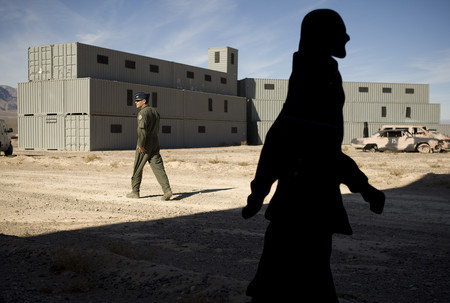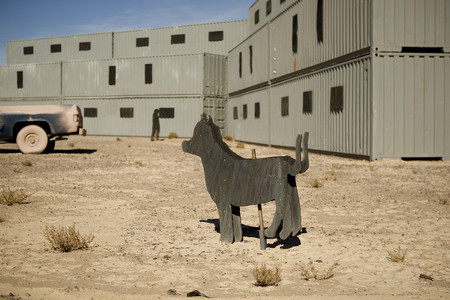Teams train to thwart terror


The skyline of “Gotham City” appeared in stark contrast Thursday to chiseled mountains and desolate valleys that surround this mock Mojave Desert town.
Black, plywood silhouettes of men, women, children and at least one dog stood between bombed-out trucks and buildings made of Sea-Land shipping containers stacked two and three stories high.
Batman was nowhere in sight.
Instead, the heroes were a ground controller named Staff Sgt. James Spreter and pilots in two A-10 Thunderbolt II jets that swooped in with their Gatling guns rumbling to unleash a barrage of cannon fire at imaginary terrorists in trucks on the city’s north end.
Since it was built in 2005, this was the first time the range commander had granted a throng of nonmilitary visitors a glimpse of the place where warplanes and ground troops rehearse for missions in Iraq and Afghanistan.
“It’s like a big sandbox in your back yard,” said Col. John P. Montgomery, commander of the Nellis Air Force Base 98th Range Wing. “Our job is to figure out what our customers want in that sand box.”
For the most part, the “customers” are special operations teams from all branches of the U.S. military.
When asked why the place formally known as the Urban Operations Complex made its public debut Thursday after having been kept so low key, he said, “This is a success story for the Air Force. There was no need to hide it. We just didn’t think about it.”
The complex, or Gotham City as airmen call it, juts from the desert floor amid Joshua trees and yucca plants along a bumpy, 20-mile-long gravel road off U.S. 95, some 40 miles northwest of Las Vegas.
It is used by Army Special Forces soldiers, Navy SEALs and other military personnel. The city was built so they could hone their skills on searching buildings, confronting enemy combatants and coordinating with air power.
“This is not just about the Air Force,” Montgomery said. “It’s about combat forces and preservation of national integrity.”
The 2.9 million-acre Nellis range, officially dubbed the Nevada Test and Training Range, is a “national treasure,” he said, because it offers fighter pilots room to conduct combat exercises in an air space that’s 150 miles long and 100 miles wide over a setting that resembles Afghanistan and Iraq.
Because it is so remote, the Urban Operations Complex is “incredibly electronically quiet. It provides us a laboratory where we can experiment.”
In the global war on terrorism, one of the so-called experiments is to try to intercept e-mail and electronic communications that terrorists might use.
“We’ll put up an Internet café and work on a computer program,” he said. “The program either will not allow him (a would-be terrorist) to send e-mail, or we make him think he sent an e-mail.”
Larry Prince, the range’s civilian target manager, said it cost about $16 million to build Gotham City, counting materials and labor. More than 2,000 sea-land containers were used in its construction. The city includes a river of painted blue rocks with small boats and an airstrip complete with F-4 jets parked in hangars and mock surface-to-air missile sites.
On this day, Spreter, the ground controller clad in camouflage and a Kevlar helmet, was positioned in view of a “bad guy” neighborhood. Occasionally, he glanced at a computer in the cab of a truck. The screen showed real-time footage of the targets taken by video cameras looking down from a remote-controlled Predator spy plane that circled high above, out of sight.
With a radio in hand, he called in the attack by the A-10s and then confirmed the damage.
“Four Gator. Mission successful. Vehicles destroyed,” he told one of the pilots.
Contact reporter Keith Rogers at krogers@reviewjournal.com or 702-383-0308.
video and slideshow











